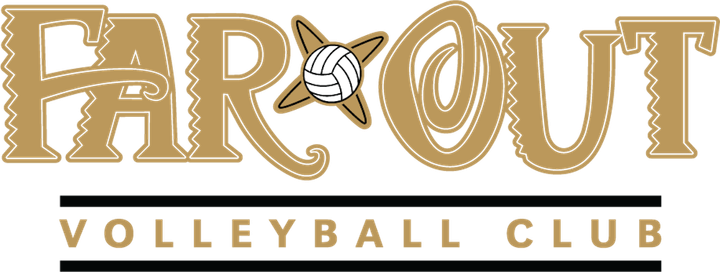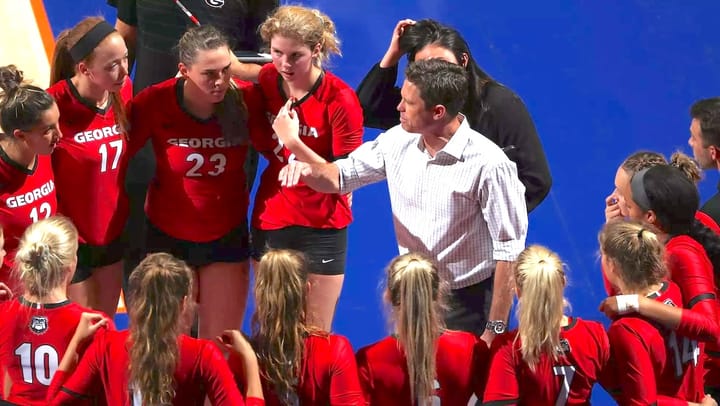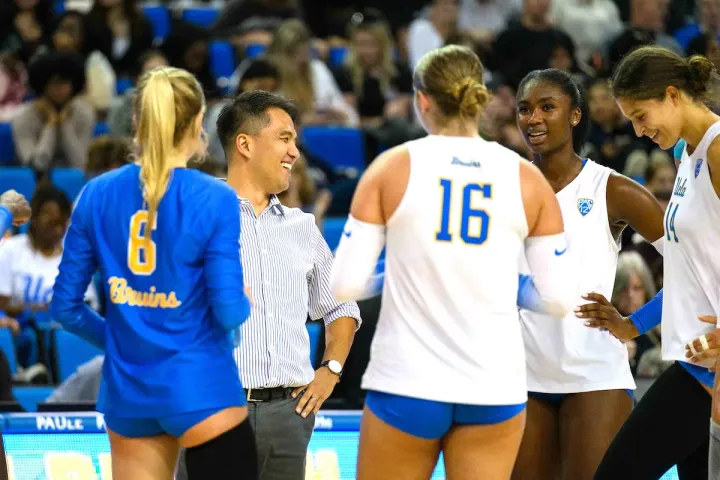15. Kelly Sheffield:'We're trying to max this thing out.'
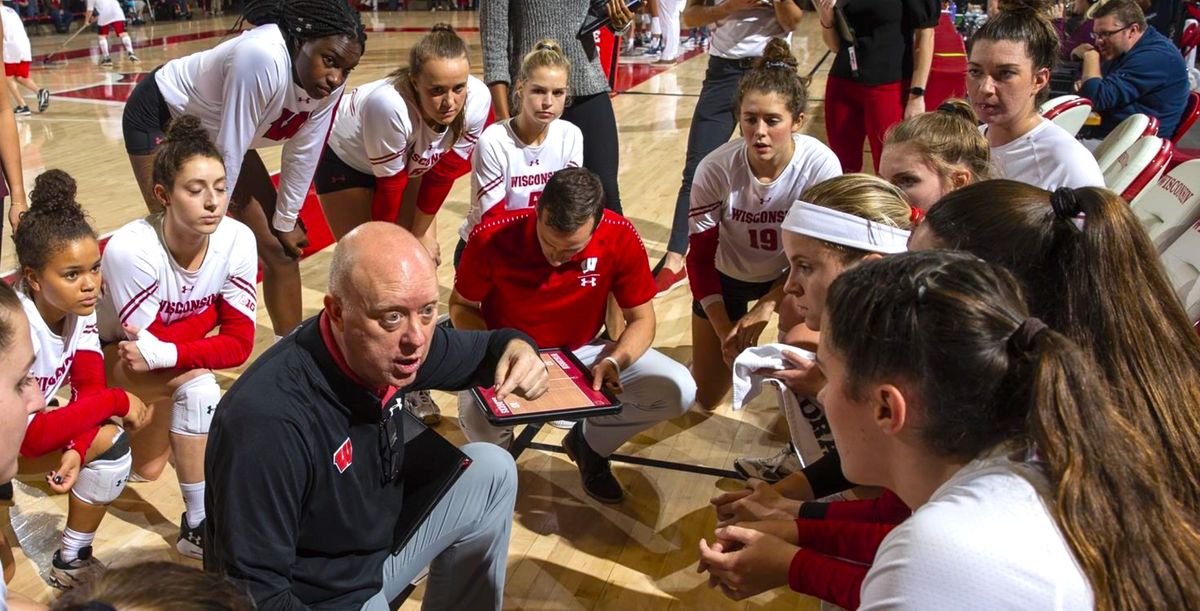
In this article we feature Kelly Sheffield, head coach for the women's volleyball team at the 'University of Wisconsin'.
We covered a lot of ground in our videocall.
There is a lot of great content in this article. Covering coaching concepts, what Kelly looks for in his players, continuous improvement, the use of data, etc, etc.
For sure check out the YouTube clips that are available; they do a great job at putting an emphasis on what Kelly cares about.
Consider this entire article (with the bonus material) as a masterclass on Kelly's and Wisconson's idea's and concepts. You're a champ if you go through this in one go. I urge you to come back to this article though...that will be the best way to further understand and maybe, hopefully implement it's content.
To end this introduction:
Wisconsin has been a serious contender for that national championship title.
Next season they will be once more.
Enter Kelly...
Kelly, why did you decide to commit to be a professional volleyball coach? What pushed you towards that decision?
I lucked into coaching, I coached at really young ages, 13, 14, 15, 16 year olds. I did some junior high and high school coaching. Did a lot of club coaching, age 16 and lower and I just did every camp I could.
I did college camps all over the place, I'd be in the gym all the time, with my notepad and I would just write everything down of what the coaches were saying, where they positioned their players, the progressions and how they would organise the structure of their practice.
For years I just couldn't get enough of it, I absolutely loved it, but never thought about having that as a career. It was just something I was passionate about.
I was in that space probably for about seven years or so. And then finally, a collegian coach, I had been working her camps for a while, well she said: "You're pretty good at this. And you obviously love it. Have you ever thought about coaching in college'?
I had never thought about that. And she said:" If I get you a job, what would you think?'
Well that was like telling a little kid: 'would you like to go play on The New York Yankees or Cincinnati Reds', I just thought that would be the coolest thing ever.
So she helped me get my first job at 27 years old. I vividly remember the first time I walked into that practice gym. I just couldn't believe it. I never played volleyball in high school or college. And to walk in that gym and see the level of athletes and the level of coaching, that just blew me away.
That's been my journey. I've been fortunate enough to be around a lot of elite coaches.
I've been curious along the way, not afraid to ask questions and now it's 30 years later and here I am in Wisconsin.
This was never a grand plan. Every job that I've been at I just thought it was so cool that I would sit there and say: 'Man, I could be here for the rest of my life and be happy'.
My first college job, I made $12,000, that's not a lot of money. I was living in Houston, Texas, and that doesn't go very far. But I remember thinking: 'I would pay $12,000 to have the job that I'm having.'
The next job I was at the university of Virginia.
There would be times that I would just be laying in bed, it would be one o'clock in the morning and I couldn't sleep...I was just thinking about volleyball. I would just get up and go the office. Still couldn't believe they gave me the keys to do this. And I just sat there and watched film on the old VHS tapes, all night long.
To me it was like going to Disneyland. It was so much fun that I just felt like that at some point somebody would just walk into my office and say: 'All right, play time is over. It's time for you to go back home.' :-)
So I've been really appreciative at every step step of the way.
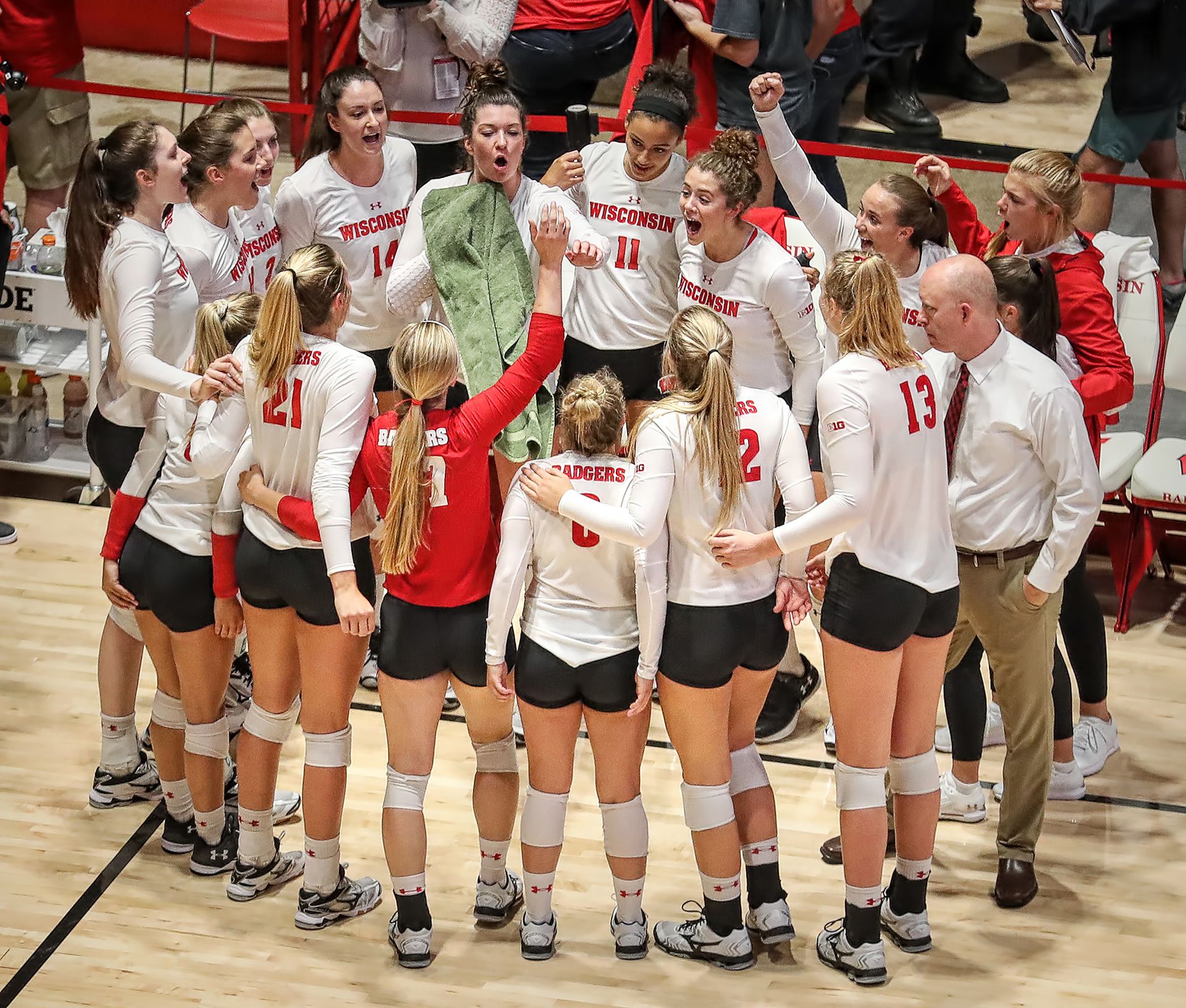
What advice would you give yourself as a starting coach? An advice that is so clear and logic to you now, but that you had to develop over the years?
When I look back as somebody that age; I didn't know what I didn't know.
You think you're a good communicator, but then you look back and you find out that wasn't true.:-)
The effort was there and I tried to do the right thing. But I probably wish I would've done things a little bit different in how I was communicating.
Communication is critical as is getting to know people. Get to know what motivates them. Try to help them get to where they're wanting to go. It's all about that.
Early on I was probably talking to them, through...what my goals were. Rather than trying to understand what their goals were and trying to help them get to where they're wanting to go.
Another advice is about learning.
I was always a lifelong learner. And I think that's a really important thing.
Curiosity.
I think that's important for any young coach, well any coach, to ask a lot of questions, to be curious, to learn along the way.
But personally, I think I've always had that in me, so probably for myself the best advice must have been to try to get to know our players better, where they're from, what their idea's about the game are, what their goals are.
Do you have a particular goal as a coach? Maybe a goal that you already reached or a goal that is so hard to reach that it gives you daily motivation?
There are lot's of things that we're still wanting here.:-)
We're trying to max this thing out. I want to help our players max out their talent, max out their potential. It's really about them. How do we help them get to their dreams, their goals.
So there's a certain responsibility on us as coaches to be able to help them do that.
And that's why it's critical to continue to learn. How do we help them academically? How do we help them technically? How do we help them win by being better tacticians? How do we be better communicators? How do we help them mentally and emotionally, and give them the resources to be able to do that? But also how do we grow the sport? Get more fans in the stands.
We're wanting to be great at everything we do. And that's a driving force.
We're going to have summer camps. And we want those to be the best experience that any of these young campers have had at a young age. So we also want to be great at that.
So maxing out is really important.
We're in the BIG10 conference, which is a pretty gnarly league and we want to continue to challenge and compete and hopefully win BIG10 titles. We won the last two.
We feel like we're an elite program, but we haven't won a national championship yet. So that's something that we're wanting to do for our players, that drives us every day. But also for our fan base and our alumni we want to be one of those exclusive few teams.
There's 330, 340 Division 1 teams and I think there's been 11, maybe 12 of them that have ever won a national championship.
We're working hard to try to join that club as well.
According to you, what rule change is necessary in the future? And why would you want to see this new rule implemented?
Obviously when you're talking about the rules, there is a difference between the international rules and the rules that we have here in the States, at least on the women's side. Internationally, there's six substitutions. We have 15.
I would probably like to see something more in the middle of those numbers.
In the States of course we are playing amateur volleyball. Participation is really important. So I think that's a big reason why there are so many subs, there are just so many kids that are playing the sport here in our country.
And if you cut the number of subs down, then you're probably shrinking the team. And if you're shrinking the teams either there are some people that aren't participating or they're moving to a lower team and all of those have a bit lesser experienced coaches, which can be detrimental for the sport also. So there's probably a balance there that's happening.
But yes, for the game it's better to have fewer subs than what we have right now.
Especially with the juniors, there are some kids that just never learn how to pass a ball because they're not asked to. And then they get to college or they get in the international game and they don't have that skill set. And we all know that that's a very critical skill set.
So I'd like to see that number, or at least over here in the States go down, maybe to 10 substitutions or something like that.
I do like the fact that the libero serves over here. I know they can't overseas, but I like that element.
But I'd also like to see some 'six rotation outside hitters' a little bit more than what we're seeing over here. :-)
About 'calls', I think we're heading in the right direction of calling a lot less double contacts, for sure about what the setter can and can't do.
The game at the net is another one, well there are some crazy calls when the ball is up above the net and probably too many of them are wrong. I would want to see that a little bit more open, get the officials out of that call a little bit more.
Let's say if you don't dig the ball off the net or if you dig it off too far, then the setter maybe not have as good of a contact. Just let that go.
Getting the officials to stop blowing whistles in the middle of rallies that would be a positive thing.
Matias: 'I would like to see what would happen when we experiment with a game with no tips, just rolls and hits?' (like Vital Heynen also mentioned in his interview)
I'm glad you said that. I'm okay with the tipping.
But I think the middle blockers that are throwing the ball, that one is really tough to defend. Especially on the quick sets, those throw downs, I'd probably rather get away with it.
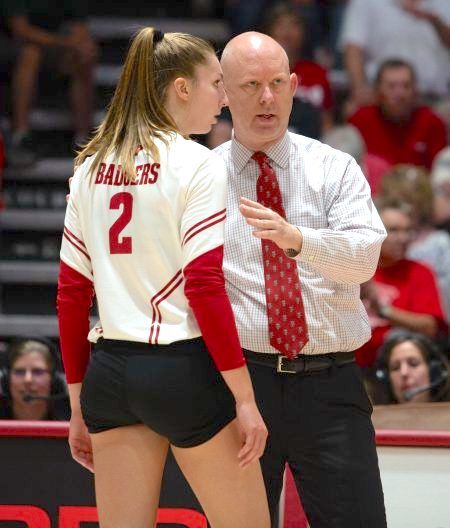
Why not ask a silly question also, we had so many serious ones. :-) So, you are Dr. Frankenstein and have the ability to put together the world's most performing volleyball player. Which characteristics do need to stand out for you?
I'm not sure I'm going to come up with anything original on here or something that hasn't been said before. :-)
I think the longer I'm doing this, that a quality that seems to be jumping out at me more than maybe when I was younger is, the ability to learn, players that can learn quickly.
That's probably not something, when I was recruiting early, where I spent a lot of time on.
